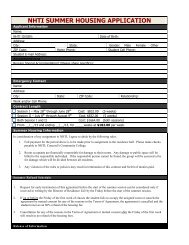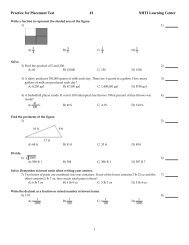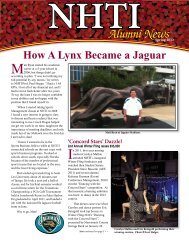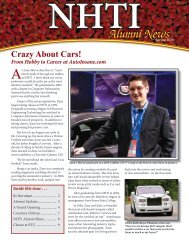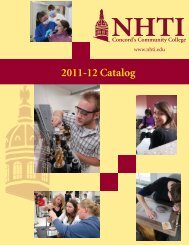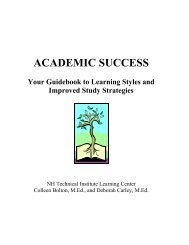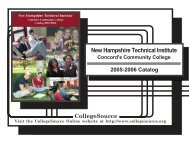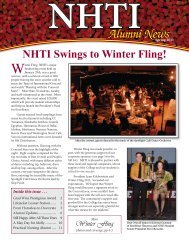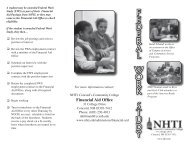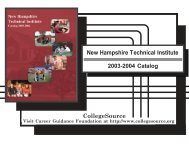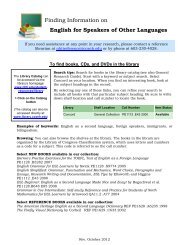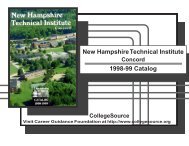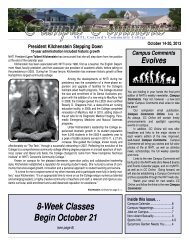Course Descriptions 11-12 - NHTI - Concord's Community College
Course Descriptions 11-12 - NHTI - Concord's Community College
Course Descriptions 11-12 - NHTI - Concord's Community College
- No tags were found...
You also want an ePaper? Increase the reach of your titles
YUMPU automatically turns print PDFs into web optimized ePapers that Google loves.
explored. Focusing on play as a foundation of children'slearning, students examine the roles and responsibilities ofthe early childhood professional with children and families inthese settings. Students will observe and evaluate programsbased on developmentally appropriate principles using theNH Early Learning Guidelines and the NAEYC Accreditationguidelines. Using the NH ECE Professional DevelopmentSystem, students discover the diversity of careeropportunities available and explore credentialing. ServiceLearning is a component of this course. (Prerequisite: EC101)EC 141 Curriculum and Environments 1 3-0-3With emergent curriculum as the overarching approach tocurriculum development, students will experience designing,implementing, and evaluating appropriate activities andenvironments for children birth through age six with a focuson music, movement, art, manipulatives and dramatic playsupported by emergent literacy and anti-bias curriculum.Emphasis will be on concrete, practical application of variousphilosophies, theories, and current research in earlychildhood education. Methods of observing children'sbehavior and progress, and developing and using suitableinstructional and play materials from these observations inall aspects of the daily routine will be emphasized.Participants will experience and broaden their own creativityand imagination through exploring learning activities that canbe applied to actual early childhood settings. Students willlearn how to plan stimulating, age-appropriate classroomand outdoor learning environments that encourage childinitiateddiscovery and act as a tool in behaviormanagement. These environments will be child and familyfriendly, barrier free, inclusionary, and meet state regulatoryrequirements.EC 142 Curriculum and Environments 2 (SRV) 3-0-3Continuing to use emergent curriculum as the overarchingapproach to curriculum development, this course will focuson designing, implementing, and evaluating appropriateactivities and environments for children through age six witha focus on blocks, math, science, woodworking, andtechnology with literacy concepts integrated into each area.Emphasis will be on the concrete, practical application ofdifferent philosophies, theories, and current research that ismanifested in various curriculum models in early childhoodeducation. Students will dialogue and reflect together as theyexplore the cycle of inquiry and project work for developing,implementing and assessing curriculum. Emphasis will be onplanning stimulating, age-appropriate classroom and outdoorlearning environments that encourage child-initiateddiscovery and act as a tool in behavior management. Theseenvironments will be child and family friendly, barrier free,inclusionary, and meet state regulatory requirements.Students will learn about and apply successful attributes ofdocumentation panels that make children's learning visible.Service Learning is a component of this course.(Prerequisite: EC 141)EC 155 Using Chldren's Literature to Support YoungChildren's Language and Literacy Development (SRV) 3-0-3High quality children's books will be used as a vehicle forsupporting and applying current research on the acquisitionof language and reading. This course will provide an overviewof exemplary authors and illustrators of children's literaturefrom birth to age 8. Students will become familiar withCaldecott Award-winning books and the artistic techniquesused to create these books. Big books will be introduced as away of distinguishing features of print. Poetry, multiculturalbooks, and bibliotherapy as applied to early childhoodeducation will be studied. Additionally, students will explorethe teacher's role in promoting family literacy and participatein service learning on this topic. Service Learning is acomponent of this course.EC 188 Health, Safety and Nutrition in Early ChildhoodEducation (SRV) 3-0-3This course offers an introduction to major issues affectingthe health and safety of young children in early childhoodsettings. Nutrition and policy considerations about pediatricmedications, infectious disease control, sick child care,universal precautions and liability, and health record keepingwill be discussed. Childhood stress and education for theprevention of child sexual abuse will be highlighted. Studentswill learn how to integrate curriculum for young childrenrelated to health, safety, and nutrition into the overallprogram. Service Learning is a component of this course.EC 190 Preparing for Practicum 1-0-1This 1 credit course will provide students with an orientationto both Practicum 1 and 2 including developing individualgoals, planning contracts, scheduling, record keeping, writingpracticum log entries, preparing the practicum notebook,organizing 3 Focused Portfolio binders, identifying potentialpracticum partners, and completing all relevant paperwork.Students will receive the NAEYC Code of Ethical Conduct anduse it as a reference in discussions around professionalboundaries in the workplace. Students will know all policiesand procedures related to practicum and student teaching asoutlined in the Practicum Handbook. Students must earn a“C” or higher in this course to move on to Practicum 1 andmust take EC 190 in the semester before Practicum 1.(Prerequisites: EC 101, EC 141 and EC 155)EC 215 Infant/Toddler Development and Programming 4-0-4This course will be a study of important influences on infantand toddler development supported by research on braindevelopment during the first three years of life. Emphasis willbe put on the role and responsibilities of families, child careteachers, and specialists in creating high quality supportiveenvironments. Sensitivity to attachment and the importanceof observation and communication skills to nurture positivefamily, caregiver, and child relationships through the roles ofprimary caregiving, transitions, and continuity of care will behighlighted as students learn to design responsive programsfor infants and toddlers and their families. (Prerequisite: EC101 with a grade of “C” or higher or permission of theDepartment Head of Early Childhood Education)EC 225 Autism Spectrum Disorder 4-0-4This course will examine the neurological underpinnings andbehavioral characteristics of children from birth through age8 with autism spectrum disorders. It will focus on anoverview of the strengths and challenges of child-centered,developmental, research-based interventions to be used innatural environments. The centrality of the family will beemphasized. (Prerequisite: EC 101 with a grade of “C” or8/17/20<strong>11</strong> <strong>NHTI</strong>, Concord’s <strong>Community</strong> <strong>College</strong> <strong>Course</strong> <strong>Descriptions</strong> 20<strong>11</strong>-20<strong>12</strong> 18



